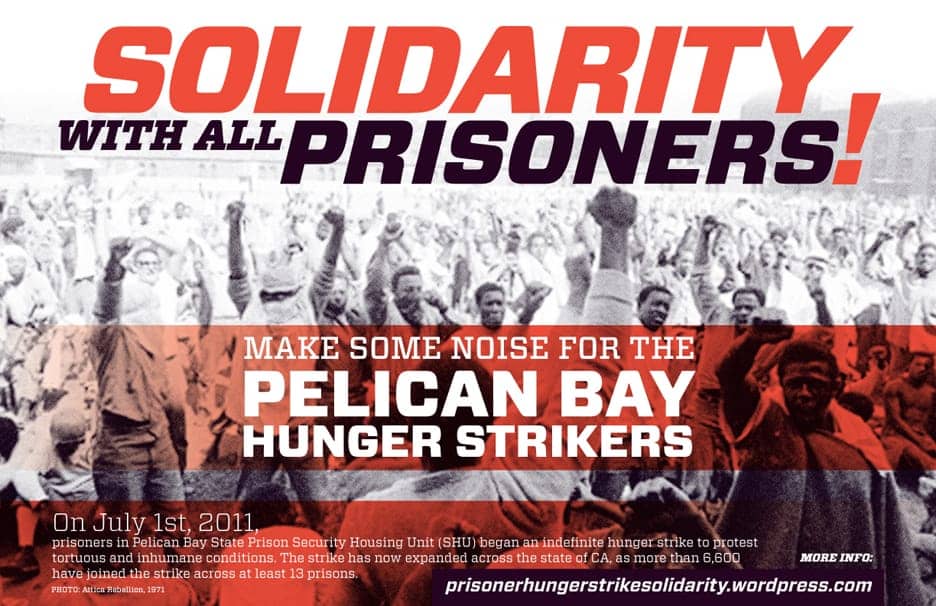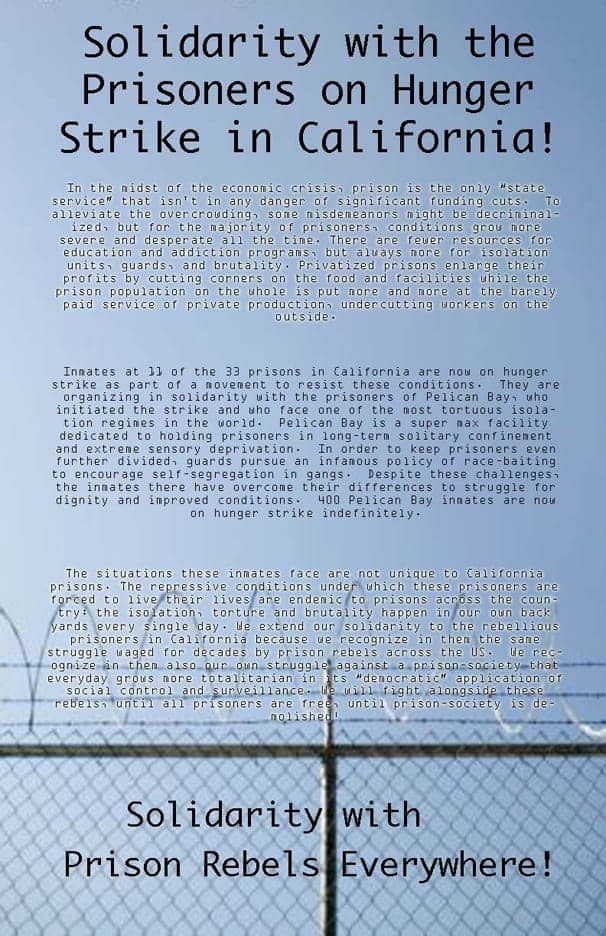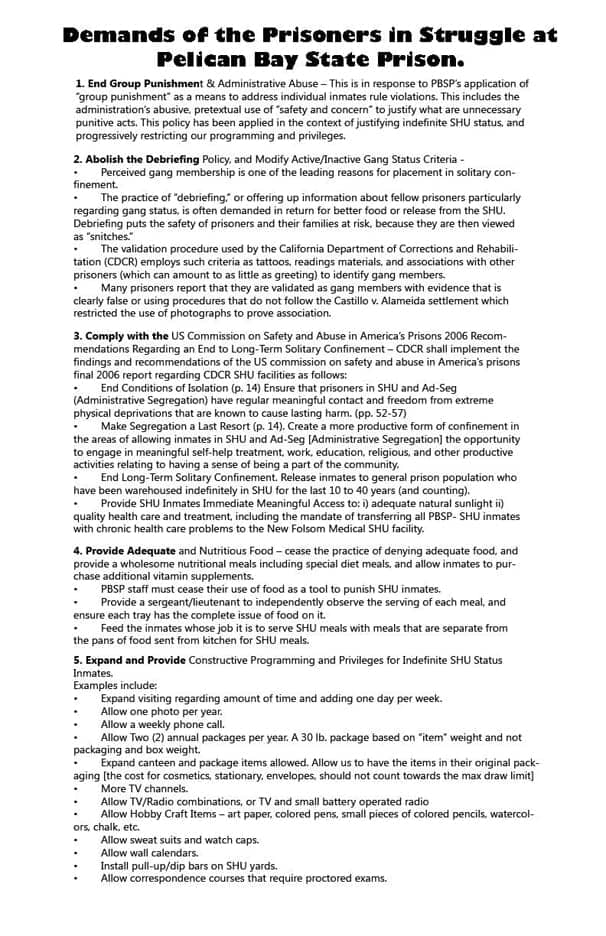As Pelican Bay strike spreads, advocates demand negotiations
by Isaac Ontiveros, Prisoner Hunger Strike Solidarity

The demands outlined by hunger strike leaders in the Security Housing Unit at Pelican Bay Prison include an end to long term confinement and collective punishment; access to food and programs; and an end to the practice of “debriefing,” or requiring prisoners to divulge information about themselves and other prisoners around gang affiliation in order to be released back into general population.
“The sheer number of prisoners participating in this strike, across conditions of isolation as well as racial and geographic lines, speaks to the urgency of these prisoners’ demands,” says Molly Porzig of the Prisoner Hunger Strike Solidarity coalition. “It is overwhelmingly clear that the CDCR has little other option than to meet these demands.”
An unnamed hunger striker at Pelican Bay told legal workers with the Prisoner Hunger Strike Solidarity coalition, “We feel the CDCR will not make meaningful changes in policy unless this strike gets so severe that prisoners start dying. But we are in this until our demands are met.”
Supporters of the hunger strikers have received notices from the CDCR that mail to prisoners at Pelican Bay is being refused. Advocates and lawyers are also concerned about the health conditions of prisoners who have the joined the strike.
“We feel the CDCR will not make meaningful changes in policy unless this strike gets so severe that prisoners start dying. But we are in this until our demands are met,” said one hunger striker at Pelican Bay.

The Prisoner Hunger Strike Solidarity coalition is continuing to try to maintain an open line of communication with hunger strikers, as well as planning rallies and protests in the days ahead and urging the public to call the CDCR to demand negotiations with strike leaders.
Click HERE for more information, including phone numbers and a sample script.
To call CDCR, dial (916) 323-6001 and say something like this: “Hi, my name is _________. I’m calling about the statewide prisoner hunger strike that began at Pelican Bay. I support the prisoners and their reasonable five core demands. I urge the CDCR to negotiate with the prisoners immediately and in good faith. Thank you.”
If you haven’t already signed the online petition, click HERE.
Frequent updates on the hunger strike can be found at www.prisonerhungerstrikesolidarity.wordpress.com.
Isaac Ontiveros of the Prisoner Hunger Strike Solidarity coalition can be reached at (510) 444-0484 or isaac@criticalresistance.org. Bay View staff contributed to this report.
Jericho Movement calls on Black journalists to cover hunger strike in mainstream media
On behalf of the National Jericho Movement, Chicago Jericho is putting out an urgent call to the National Association of Black Journalists requesting that it marshal its membership to guarantee that the Pelican Bay hunger strike be extensively covered by one or more of its members enjoying national recognition as a seasoned, veteran journalist.

It is time to demand that this nation, which claims itself to be the land of liberty and justice for all, conduct itself in a manner consistent with that claim and abide by all of the articles, charters, conventions and treaties of the United Nations, including those that recognize the right to self-determination for national minorities, for which people of Afrikan descent living in America – as the offspring of those abducted, taken captive, forced into exile and sold into bondage – meet the full criteria.
Contact the National Jericho Movement by emailing jerseyjericho@gmail.com, chicagojericho@gmail.com or richmondjericho@gmail.com.
Pressure your elected officials to take a stand
San Francisco activist Charlie Hinton writes: “I just called the Department of Corrections and ‘Rehabilitation’ and my state legislators, Sen. Mark Leno and Assemblyman Tom Ammiano. The man at CDCR sounded like they were getting calls, and he listened, but in a hostile way. Seems like Leno and Ammiano aren’t getting a lot of calls, and neither has made a public statement. Their offices sounded more open, so here are the numbers for San Francisco’s state legislators:
• Sen. Mark Leno: (916) 651-4003 in Sacramento or (415) 557-1300 in San Francisco
• Assemblyman Tom Ammiano: (916) 557-3013 in Sacramento or (415) 319-2013 in San Francisco
• Sen. Leland Yee: (916) 651-4008 in Sacramento or (415) 557-7857 in San Francisco
• Assemblywoman Fiona Ma: (916) 319-2012 in Sacramento or (415) 557-2312 in San Francisco
Also call Gov. Jerry Brown at (916) 445-2841. He has the ultimate authority to order the CDCR to meet the prisoners’ demands.
To call your elected officials anywhere in the country, look them up HERE and urge them to pressure the California Department of Corrections to negotiate with the prisoners and honor their demands.
When calling elected officials anywhere, you might say something like this: “Hi, my name is _________ and I live in your district. I’m calling about the statewide prisoner hunger strike that began at Pelican Bay. I support the prisoners and their reasonable five core demands. I urge you to make sure the California Department of Corrections negotiates with the prisoners immediately and in good faith. Thank you.”
Quaker group joins prison hunger strikers
The San Francisco region of the American Friends Service Committee supports the demands of hunger strikers at the Pelican Bay State Prison, recognizing that their demands match the group’s own recommended changes in isolation practices.
AFSC is calling for a “rolling fast” of people on the outside who support the strikers. People are signing up to fast for one day in solidarity with all prisoners held in solitary confinement. Email pmr@afsc.org to have your participation registered.
The prisoners’ demands of the California Department of Corrections are:
• Implement individual accountability. End the use of “group punishments” – lockdowns of entire yards or of all prisoners in an ethnic group – for rule violations by a single prisoner or a few.
• Abolish the debriefing policy and modify active/inactive gang status criteria. Racial profiling via gang affiliation labels is imposed by CDCR staff without judicial review. Such a “gang status” label will punish a prisoner in solitary for years, from which he can escape only by parole, death or “debriefing” – snitching on other alleged gang members.
• Modify conditions of long-term solitary confinement to avoid lasting harm. Ensure that prisoners in SHU (Security Housing Units) and Ad-Seg (Administrative Segregation) have regular, meaningful contact and freedom from extreme physical deprivations. Make segregation a last resort. End long-term solitary confinement and release prisoners into the general population within shorter periods of time. Provide SHU prisoners with immediate access to sunlight and healthcare treatment.
• Provide adequate food. Cease the practice of denying adequate food as an additional punishment.
• Provide constructive programming and privileges for “indefinite SHU status” inmates.
“Our research shows that over 14,000 prisoners are being held in long term isolation in California, including over 3500 in security housing units and over 7500 in administrative segregation,” says Laura Magnani, regional director of the San Francisco region. “Conditions clearly qualify as torture and result in serious deterioration and decompensation of prisoners. We strongly embrace the changes prisoners have identified.”
For more information, contact the American Friends Service Committee at (415) 565-0201 or through Stephen McNeil at SMcNeil@afsc.org.
From Bangladesh
Commentator Farooque Chowdhury, based in Dhaka, Bangladesh, compiles and quotes mainstream reports on the hunger strike in a story published July 10 by CounterCurrents headlined “Prisoners Protest in California.” He begins by saying:
“The prisoners’ protest in California reiterates the … fact [that] there is no difference between center and periphery in terms of prison condition. And prison, a tool to rule, mirrors the ruling political arrangement.”
Following a quote from “The Penal State in an Age of Crisis“ by Hannah Holleman, Robert W. McChesney, John Bellamy Foster and R. Jamil Jonna in Monthly Review – “The United States … is number one with the proverbial bullet when it comes to locking up its own people. No thug dictator, no psychopathic madman anywhere in the world can touch the United States in this regard.” – he concludes, “It will not be an irrational hope that lessons will be learned in other lands also.”





